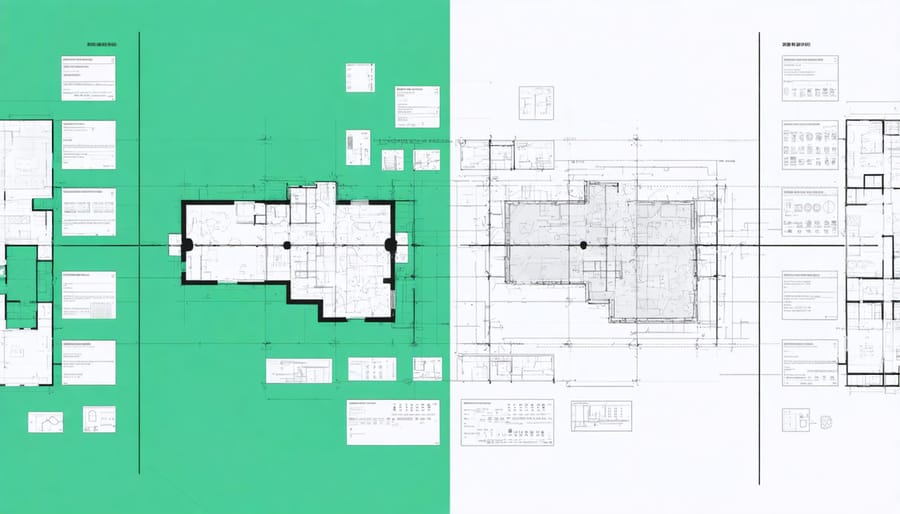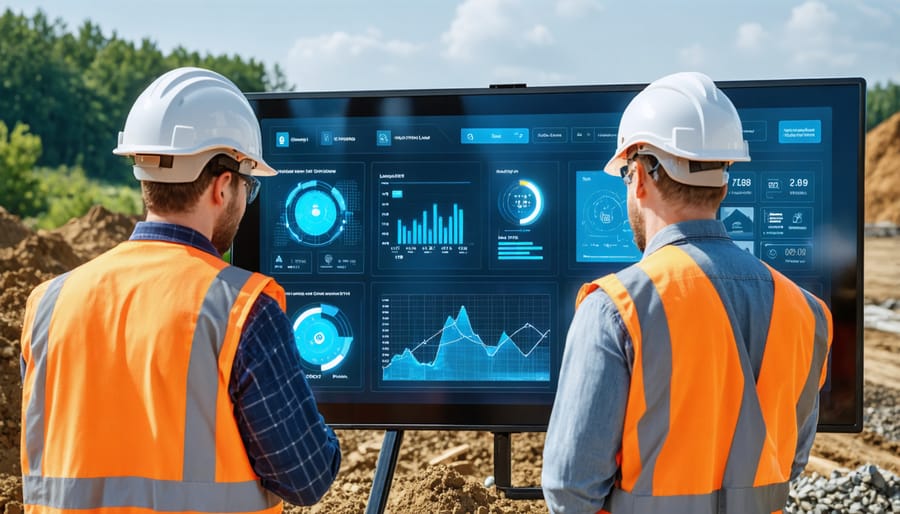Artificial Intelligence is rapidly revolutionizing construction project management, transforming how industry leaders approach complex infrastructure developments. Machine learning algorithms now analyze vast datasets from previous projects to predict potential risks, optimize resource allocation, and reduce completion timelines by up to 20%. Forward-thinking construction firms leverage AI-powered tools to automate routine tasks, from progress monitoring to equipment maintenance scheduling, while sophisticated neural networks process real-time site data to ensure safety compliance and quality control. This technological revolution demands a structured approach to implementation, combining strategic planning with practical deployment methods that align with existing workflows and team capabilities. By adopting AI-driven solutions, construction professionals can significantly enhance project outcomes, reduce costly errors, and maintain competitive advantage in an increasingly digitized industry landscape.
The Evolution of AI-Driven Project Planning in Construction

Key AI Technologies Reshaping Project Planning
Several groundbreaking AI technologies are transforming how construction projects are planned and executed. AI-powered digital planning systems now utilize machine learning algorithms to analyze historical project data, identifying patterns and potential risks before they materialize. Predictive analytics tools can forecast project timelines with unprecedented accuracy, considering variables such as weather conditions, resource availability, and supply chain dynamics.
Automation platforms are streamlining routine planning tasks, from resource allocation to schedule optimization. These systems can process vast amounts of data to generate optimal work sequences and resource distribution plans. Advanced neural networks are being employed to analyze construction drawings and specifications, automatically identifying conflicts and suggesting solutions before construction begins.
Natural Language Processing (NLP) capabilities are enhancing communication between project stakeholders by automatically extracting critical information from project documents and generating actionable insights. Meanwhile, computer vision technology is being integrated into planning tools to monitor progress and verify that execution aligns with digital plans, creating a seamless feedback loop between planning and implementation phases.
Real-Time Data Integration and Analysis
Modern AI systems excel at processing vast amounts of construction project data in real-time, transforming raw information into actionable insights for improved decision-making. These systems continuously monitor and analyze data streams from multiple sources, including IoT sensors, construction management software, and project documentation.
By leveraging machine learning algorithms, AI platforms can identify patterns and correlations that might escape human observation. For instance, AI systems can simultaneously track material delivery schedules, labor productivity rates, and weather conditions to predict potential delays or bottlenecks before they impact project timelines.
The integration capabilities extend to analyzing historical project data alongside current metrics, enabling more accurate forecasting and risk assessment. AI tools can process structured data like cost reports and schedules, as well as unstructured data such as site photographs and daily progress reports, providing a comprehensive view of project status.
Real-time analytics also facilitate immediate response to changing site conditions. When integrated with Building Information Modeling (BIM) systems, AI can automatically flag deviations from design specifications and suggest corrective actions, ensuring quality control throughout the construction process. This continuous monitoring and analysis capability significantly reduces reaction time to potential issues and enhances overall project efficiency.
Core Benefits of AI Project Planning Systems

Risk Prediction and Mitigation
AI-powered risk prediction has revolutionized project planning by utilizing advanced algorithms and machine learning to identify potential risks before they materialize. These systems analyze historical project data, current market conditions, and real-time project metrics to create comprehensive risk profiles and suggest targeted mitigation strategies.
The technology examines multiple data points, including weather patterns, supply chain disruptions, labor availability, and equipment maintenance schedules, to forecast potential challenges. By processing this information through predictive models, AI can calculate risk probabilities and their potential impact on project timelines and budgets with remarkable accuracy.
When risks are identified, AI systems automatically generate mitigation recommendations based on successful strategies from similar past projects. For instance, if weather-related delays are predicted, the system might suggest adjusting the construction sequence or recommending specific materials better suited for adverse conditions.
Real-time monitoring capabilities allow AI to continuously update risk assessments as project conditions change. This dynamic approach enables project managers to respond proactively to emerging threats rather than reactively addressing problems after they occur. The system can also prioritize risks based on their severity and likelihood, helping teams allocate resources more effectively.
Integration with project management platforms ensures that risk alerts and mitigation strategies are immediately communicated to relevant stakeholders, enabling quick decision-making and coordinated responses to potential challenges.
Resource Optimization and Cost Control
AI-driven resource optimization tools are revolutionizing how construction projects manage and allocate their resources, bringing unprecedented efficiency to managing project costs and resource utilization. These sophisticated systems analyze historical project data, current market conditions, and real-time project progress to make informed decisions about resource allocation.
By leveraging machine learning algorithms, AI systems can predict resource requirements with remarkable accuracy, helping project managers avoid both over-allocation and shortages. The technology considers multiple variables simultaneously, including labor availability, equipment utilization, material costs, and scheduling constraints, to optimize resource distribution across different project phases.
Cost control benefits significantly from AI’s predictive capabilities. The system continuously monitors expenditure patterns, identifies potential cost overruns before they occur, and suggests corrective actions. AI algorithms can analyze thousands of cost scenarios in minutes, providing project managers with data-driven recommendations for cost-saving opportunities.
Real-time monitoring and adjustment capabilities enable swift responses to changing project conditions. When unexpected situations arise, AI systems can quickly recalculate resource requirements and suggest alternative allocation strategies, maintaining project efficiency while minimizing cost impacts. This dynamic approach to resource management ensures that projects stay on budget while maintaining optimal performance levels throughout their lifecycle.
Implementation Strategy and Best Practices
Integration with Existing Systems
Integrating AI tools into existing project management systems requires a strategic approach to ensure smooth implementation without disrupting ongoing operations. Begin by conducting a thorough assessment of your current project management framework, identifying key touchpoints where AI can enhance efficiency and decision-making processes.
Start with a pilot program in a controlled environment, selecting a specific project phase or department for initial implementation. This approach allows teams to familiarize themselves with AI tools while minimizing potential risks. Ensure your data infrastructure is compatible with the chosen AI solutions, focusing on standardizing data formats and establishing clear protocols for information exchange.
Training is crucial for successful integration. Develop a comprehensive training program that addresses both technical aspects and practical applications. Include hands-on sessions where team members can practice using AI tools in real-world scenarios. Consider appointing AI champions within each department to provide ongoing support and guidance.
Establish clear metrics for measuring the effectiveness of AI integration, including key performance indicators (KPIs) such as time savings, accuracy improvements, and resource optimization. Regular monitoring and feedback sessions help identify areas for adjustment and optimization.
Integration should be iterative, with each phase building upon lessons learned from previous implementations. Document best practices, challenges encountered, and solutions developed to create a knowledge base for future reference. Maintain open communication channels between IT teams, project managers, and end-users to address concerns and share successes promptly.
Team Training and Adaptation
Successful implementation of AI project planning tools requires a structured approach to team training and adaptation. Begin by identifying key team members who will serve as AI champions within your organization. These individuals should receive comprehensive training first and can later assist in training others, creating a cascade effect of knowledge transfer.
Develop a phased training program that starts with basic AI concepts and gradually progresses to advanced features. Include hands-on workshops where team members can practice using the AI tools with real project data. This practical experience is crucial for building confidence and competency.
Create detailed documentation and quick-reference guides tailored to your organization’s specific workflows. These resources should be easily accessible and regularly updated as the AI tools evolve. Consider implementing a mentor system where experienced users can support newcomers during the transition period.
Monitor team progress through regular assessments and feedback sessions. Address concerns promptly and adjust training methods based on team performance and adoption rates. Celebrate early wins and share success stories to maintain momentum and encourage widespread adoption.
Establish clear communication channels for technical support and problem-solving. Consider partnering with AI vendors for specialized training sessions and ongoing support. Remember that adaptation is an iterative process – allow time for teams to adjust and become comfortable with new workflows while maintaining productivity standards.

Case Study: AI Planning Success in Major Construction Projects
The transformative power of AI in construction project planning is best illustrated through real-world applications. One notable example is the Dubai Creek Tower project, where successful AI implementation reduced planning time by 37% and optimized resource allocation across multiple construction phases.
The AI system analyzed historical data from similar high-rise projects, weather patterns, and local construction regulations to create adaptive scheduling models. This resulted in a 28% reduction in material waste and a 42% improvement in labor efficiency. The platform’s machine learning capabilities continuously refined project timelines based on real-time progress data, enabling project managers to make proactive adjustments.
Another compelling case study comes from the expansion of Singapore’s Changi Airport Terminal 5. The project team deployed an AI-powered planning system that integrated BIM (Building Information Modeling) with predictive analytics. This integration enabled:
– Automated conflict detection in construction sequences
– Real-time adjustment of workforce deployment based on progress monitoring
– Precise material delivery scheduling that reduced on-site storage requirements by 40%
– Risk assessment modeling that prevented an estimated 23 potential schedule delays
The London Crossrail project demonstrates how AI planning tools can manage complexity in large-scale infrastructure development. The system processed data from over 30 concurrent construction sites, coordinating thousands of workers and equipment pieces. The AI platform’s ability to optimize scheduling reduced project overhead costs by 15% and improved safety metrics by identifying high-risk activity patterns before incidents occurred.
These cases highlight common success factors in AI planning implementation:
1. Integration with existing project management systems
2. Comprehensive data collection and analysis capabilities
3. Adaptive learning from ongoing project feedback
4. Clear communication protocols between AI systems and human decision-makers
5. Scalable solutions that can handle project complexity
The measurable outcomes from these projects have set new benchmarks for the industry, proving that AI-driven planning is no longer just theoretical but a practical necessity for modern construction management.
The integration of AI in construction project planning represents a transformative shift in how the industry approaches complex projects. As we’ve explored throughout this article, AI technologies are not just enhancing traditional planning methods but revolutionizing them entirely. The benefits of improved risk assessment, resource optimization, and predictive analytics have demonstrated clear ROI for early adopters in the construction sector.
Looking ahead, the construction industry can expect AI to become increasingly sophisticated and accessible. Machine learning algorithms will continue to evolve, offering more precise predictions and recommendations based on ever-growing datasets. The combination of AI with other emerging technologies like IoT sensors and digital twins will create even more powerful planning tools for construction professionals.
However, successful implementation requires a strategic approach. Organizations must invest in proper training, infrastructure, and change management to fully realize AI’s potential. The key to success lies in viewing AI not as a replacement for human expertise but as a powerful tool that enhances decision-making capabilities.
For construction firms looking to remain competitive in the coming years, embracing AI in project planning is no longer optional but necessary. Those who adapt early will gain significant advantages in efficiency, cost reduction, and project outcomes. As the technology matures and becomes more widespread, we can expect to see standardization of AI applications across the industry, making implementation more straightforward for companies of all sizes.

